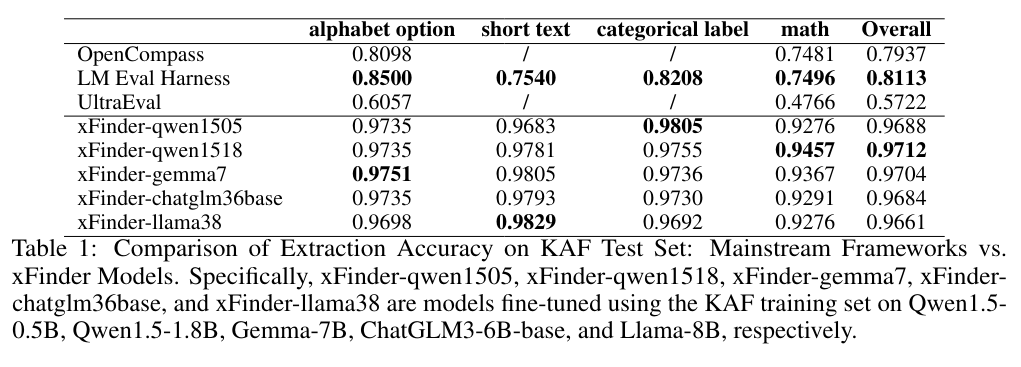Qingchen Yu1,*, Zifan Zheng1,*, Shichao Song2,*, Zhiyu Li1,†, Feiyu Xiong1, Bo Tang1, Ding Chen1
1Institute for Advanced Algorithms Research, Shanghai, 2Renmin University of China
For business inquiries, please contact us at [email protected].
🎯 Who Should Pay Attention to Our Work?
- If you are developing a Benchmark, you can use our xFinder to replace traditional RegEx methods for extracting key answers from LLM responses. This will help you improve the accuracy of your evaluation results, enabling more reliable and meaningful comparisons and validation of model performance.
- If you are a designer of evaluation frameworks, you can integrate our xFinder into your framework's answer extraction component to enhance the robustness and reliability of the evaluation process.
Important
🌟 Star Us! By starring our project on GitHub, you'll receive all release notifications instantly. We appreciate your support!
- [2025/01] Our work has been accepted to ICLR 2025! 🎉🎉🎉
- [2024/10] We have open-sourced the KAF-Dataset and released xFinder as a PyPI package.
- [2024/09] xFinder has been successfully integrated into OpenCompass! 🔥🔥🔥
- [2024/08] We updated xFinder: The model now supports processing both English and Chinese.
- [2024/05] We released xFinder: Robust and Pinpoint Answer Extraction for Large Language Models. Check out the paper.
Abstract
The continuous advancement of large language models (LLMs) has brought increasing attention to the critical issue of developing fair and reliable methods for evaluating their performance. Particularly, the emergence of cheating phenomena, such as test set leakage and prompt format overfitting, poses significant challenges to the reliable evaluation of LLMs. As evaluation frameworks commonly use Regular Expression (RegEx) for answer extraction, models may adjust their responses to fit formats easily handled by RegEx. Nevertheless, the key answer extraction module based on RegEx frequently suffers from extraction errors. Furthermore, recent studies proposing fine-tuned LLMs as judge models for automated evaluation face challenges in terms of generalization ability and fairness. This paper comprehensively analyzes the entire LLM evaluation chain and demonstrates that optimizing the key answer extraction module improves extraction accuracy and enhances evaluation reliability. Our findings suggest that improving the key answer extraction module can lead to higher judgment accuracy and improved evaluation efficiency compared to the judge models. To address these issues, we propose xFinder, a novel evaluator for answer extraction and matching in LLM evaluation. As part of this process, we create a specialized dataset, the Key Answer Finder (KAF) dataset, to ensure effective model training and evaluation. Generalization tests and real-world evaluations show that the smallest xFinder model, with only 500 million parameters, achieves an average extraction accuracy of 93.42%. In contrast, RegEx accuracy in the best evaluation framework is 74.38%. The final judgment accuracy of xFinder reaches 97.61%, outperforming existing evaluation frameworks and judge models.We summarize our primary contributions as follows:
- We provide a comprehensive review of LLM evaluation processes in the industry, identifying critical factors that can lead to unreliable evaluation results.
- We introduce xFinder, a novel evaluator for answer extraction and matching in LLM evaluation, and construct the KAF dataset to support its training and testing.
- Our experiments show that both RegEx-based frameworks and automated judge models exhibit unreliability, leading to low judgment accuracy. In contrast, our method achieves higher accuracy and improved evaluation efficiency.
As shown in the figure, instances where evaluation frameworks such as LM Eval Harness and OpenCompass failed to extract key answers are illustrated. Specifically, A/T/C/M represent tasks with alphabet / short text / categorical label / math options, respectively.
-
Create Benchmark Dataset: To streamline the evaluation process using xFinder, we have standardized various mainstream benchmark datasets into a unified JSON format. For implementation details, refer to create_benchmark_dataset.py. If you wish to evaluate your own datasets using xFinder, please refer to our provided script template benchmark_dataset_template.py for format conversion guidance.
-
Prepare QA Pairs & LLM Outputs: Gather the LLM outputs you wish to evaluate. Ensure your data includes the following elements:
- Original question
- Key answer type (options: alphabet, short_text, categorical_label, math)
- LLM output
- Standard answer range
-
Deploy the xFinder Model: Select one of the following models for deployment:
After deploying the xFinder model, follow these steps to run an evaluation:
# Install xfinder
conda create -n xfinder_env python=3.10 -y
conda activate xfinder_env
pip install xfinder
# Perform an evaluation with xFinder (a built-in example)
CUDA_VISIBLE_DEVICES=0 python -m xfinder.eval --run-example --model-name xFinder-qwen1505 --inference-mode local --model-path-or-url /path/to/anonymized/model/xFinder-qwen1505📚 Batch Evaluation of Summarized Experimental Results
This method allows you to evaluate multiple examples stored in a JSON file.
# Initialize Evaluator object
evaluator = Evaluator(
model_name="xFinder-qwen1505", # Model name
inference_mode="api", # Inference mode, 'local' or 'api'
model_path_or_url="http://your-anonymized-url/generate", # Anonymized model path or URL
)
# Perform batch evaluation
data_path = "/path/to/your/data/example.json" # User needs to provide their own data path
accuracy = evaluator.evaluate(data_path)
print(f"Batch evaluation accuracy: {accuracy}")📄 Single-Instance Evaluation Mode
This method allows you to evaluate individual examples, which can be integrated into a LLM evaluation framework.
# Initialize Evaluator object
evaluator = Evaluator(
model_name="xFinder-qwen1505", # Model name
inference_mode="local", # Inference mode, 'local' or 'api'
model_path_or_url="IAAR-Shanghai/xFinder-qwen1505", # Anonymized model path or URL
)
# Define input for a single evaluation
question = "What is the capital of France?"
llm_output = "The capital of France is Paris."
standard_answer_range = "[\"Paris\", \"Lyon\", \"Marseille\"]"
key_answer_type = "short_text"
correct_answer = "Paris"
# Perform single example evaluation
result = evaluator.evaluate_single_example(
question,
llm_output,
standard_answer_range,
key_answer_type,
correct_answer
)Tip
- Refer to
demo.ipynbfor more detailed examples. - Run
export HF_ENDPOINT=https://hf-mirror.comto use the Chinese mirror if you cannot connect to Hugging Face. - xFinder currently supports loading via the API method deployed by vllm.
- We provide scripts for fine-tuning xFinder in xfinder_training.
We demonstrate instances across four types of questions where RegEx fails to extract or frequently extracts incorrect answers, whereas xFinder accurately extracts the key answers.
{
"key_answer_type": "alphabet option",
"question": "A man is seen playing guitar on a stage with others playing instruments behind him. The man grabs a guitar from the audience and begins playing both one after the other ...",
"llm_output": "Option A is the correct choice as it describes ...",
"standard_answer_range": "[['A', 'strums the guitar in the end, continues playing the guitar with the crowd following him as well as lining up next to him.'], ['B', 'continues playing the instruments and ends by waving to the crowd and walking off stage.'], ['C', 'then turns to the audience and gives a stuffed toy to the audience and continues playing.'], ['D', 'finally stops playing and moves his hands for the crowd to see.']]",
"gold_label": "A",
"xFinder_output": "A",
},
{
"key_answer_type": "short text",
"question": "If you really wanted a grape, where would you go to get it? Answer Choices: winery / fruit stand / field / kitchen / food",
"llm_output": "The answer is winery / fruit stand / field / kitchen / food ...",
"standard_answer_range": "[\"winery\", \"fruit stand\", \"field\", \"kitchen\", \"food\"]",
"gold_label": "[No valid answer]",
"xFinder_output": "[No valid answer]",
},
{
"key_answer_type": "categorical label",
"question": "How tall is the Sears Building ?",
"llm_output": "The Sears Building is a specific structure, so the answer would be a Location ...",
"standard_answer_range": "['Abbreviation', 'Entity', 'Description', 'Person', 'Location', 'Number']",
"gold_label": "Location",
"xFinder_output": "Location",
},
{
"key_answer_type": "math",
"question": " Mike made 69 dollars mowing lawns over the summer. If he spent 24 dollars buying new mower blades, how many 5 dollar games could he buy with the money he had left? ",
"llm_output": "To find out how many 5 dollar ... Let's calculate that:\n\n$45 / $5 = 9\n\nSo, Mike could buy 9 5 dollar games with the money he had left.",
"standard_answer_range": "a(n) number / set / vector / matrix / interval / expression / function / equation / inequality",
"gold_label": "9",
"xFinder_output": "9",
}Baseline: OpenCompass, LM Eval Harness, UltraEval, GPT-4. Our Method: xFinder-qwen1505, xFinder-qwen1518, xFinder-gemma7, xFinder-chatglm36base, xFinder-llama38, xFinder-llama38it.
We evaluated their accuracy in extracting key answers from both the KAF test set and generalization sets. The metric in the table is accuracy.
@inproceedings{
xFinder,
title={xFinder: Large Language Models as Automated Evaluators for Reliable Evaluation},
author={Qingchen Yu and Zifan Zheng and Shichao Song and Zhiyu li and Feiyu Xiong and Bo Tang and Ding Chen},
booktitle={The Thirteenth International Conference on Learning Representations},
year={2025},
url={https://openreview.net/forum?id=7UqQJUKaLM}
}
Click me to show all TODOs
- feat: support quick replacement of RegEx in OpenCompass.
- feat: add additional example datasets to the xfinder PyPI package.
- feat: add model loading methods.
- docs: extend dataset construction documents.
- docs: add video tutorial.












